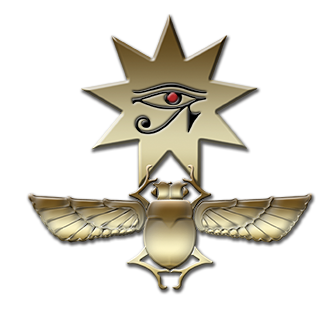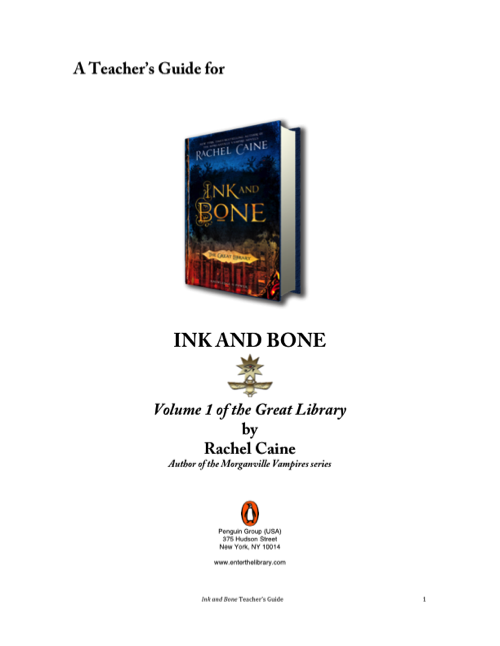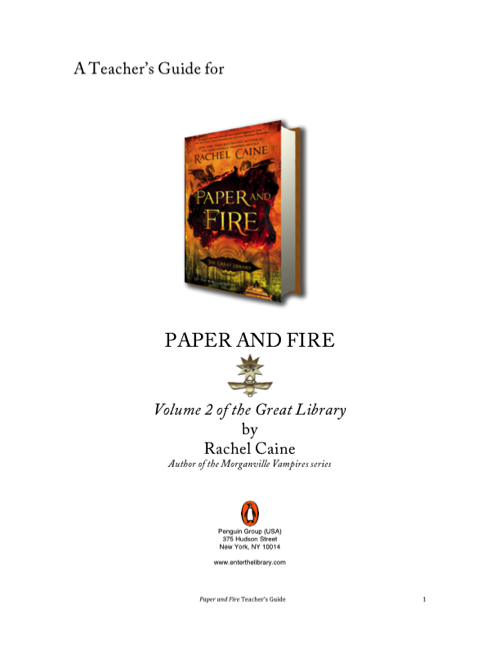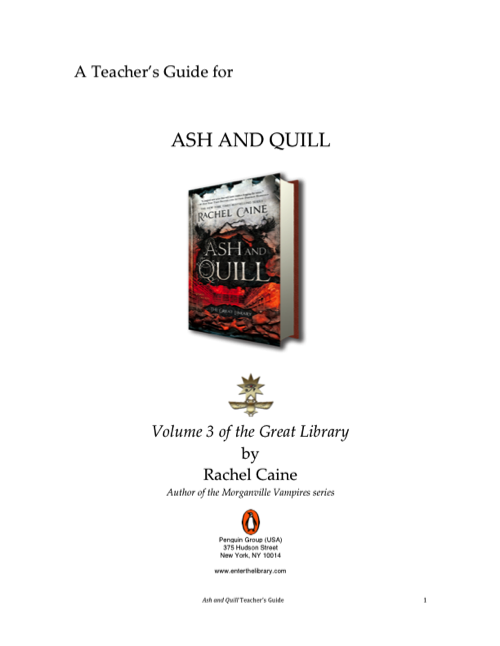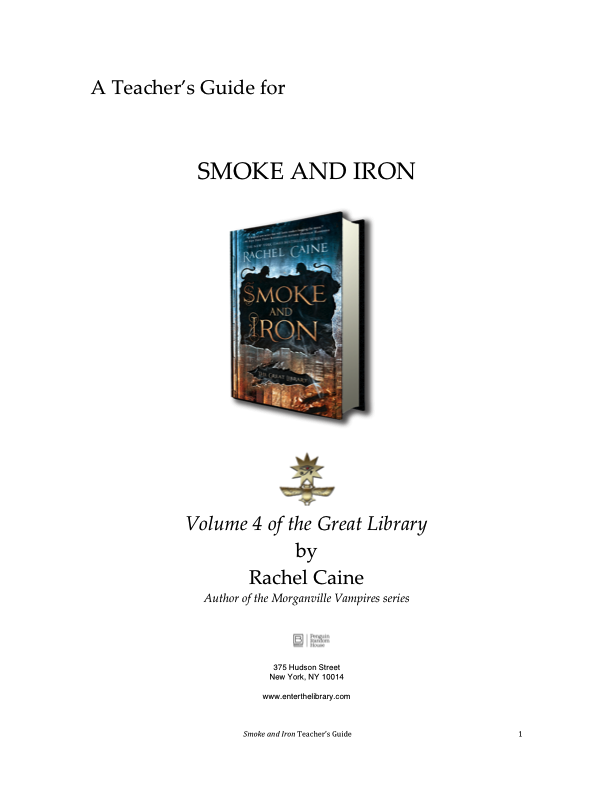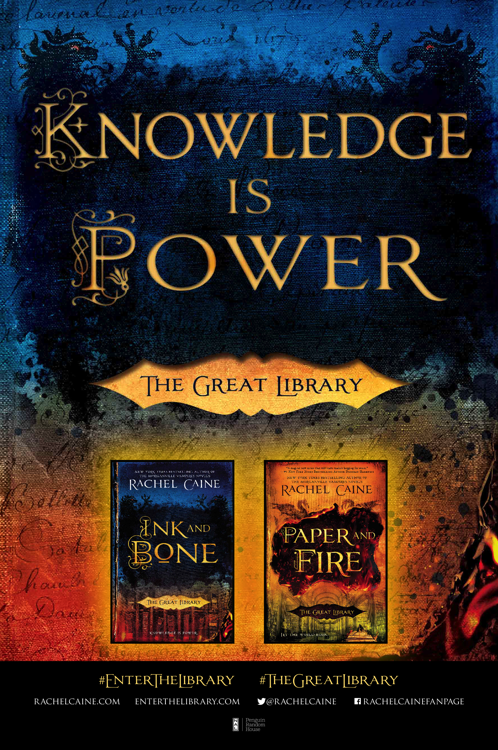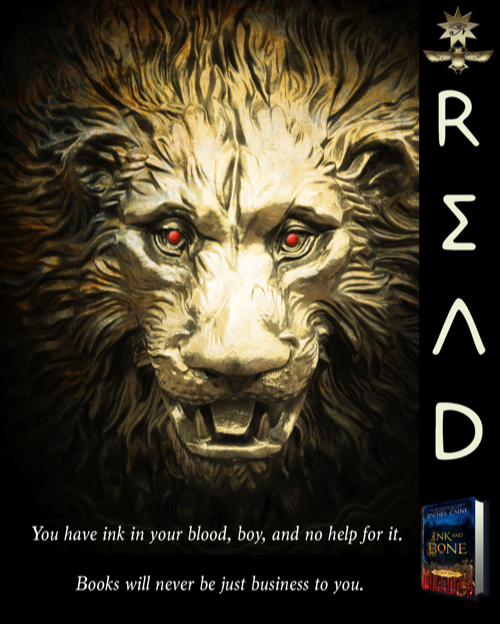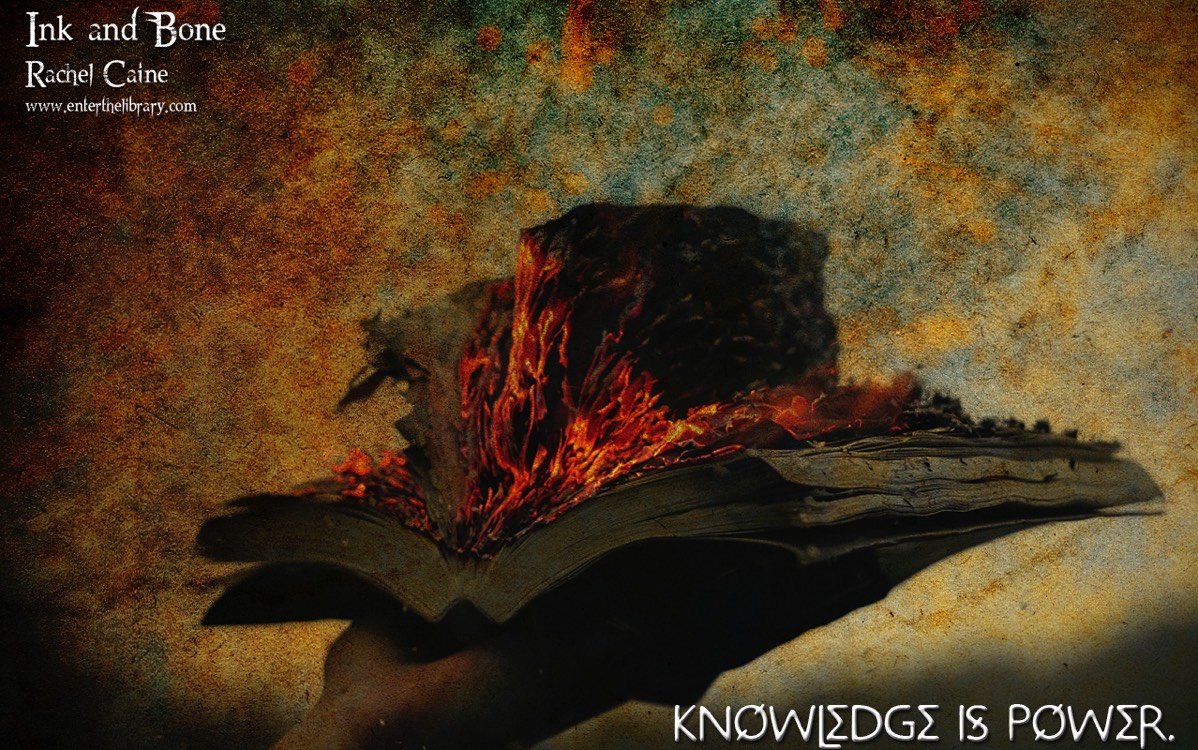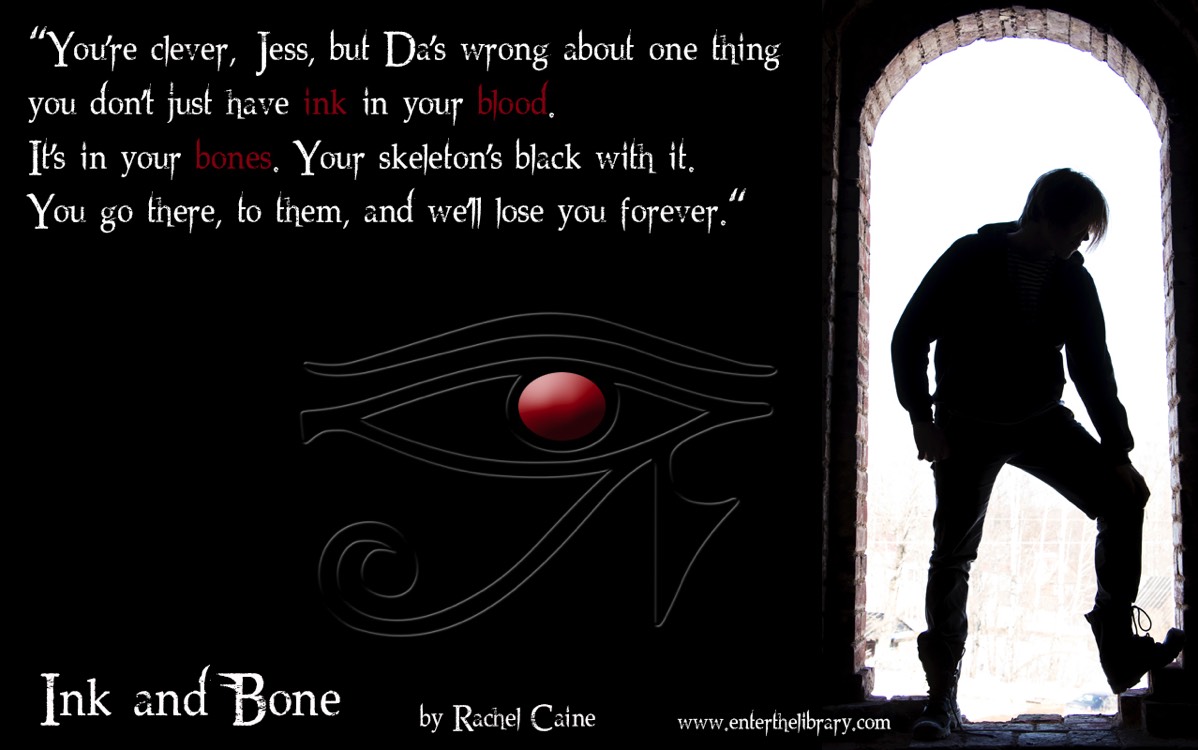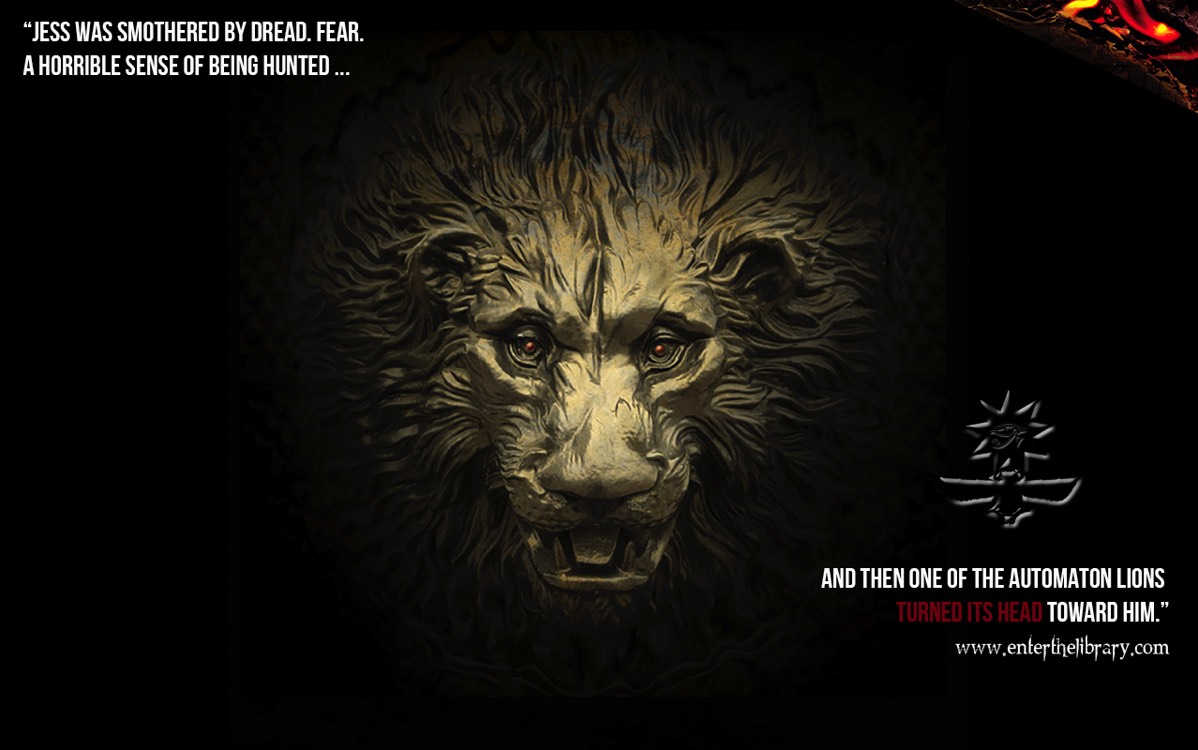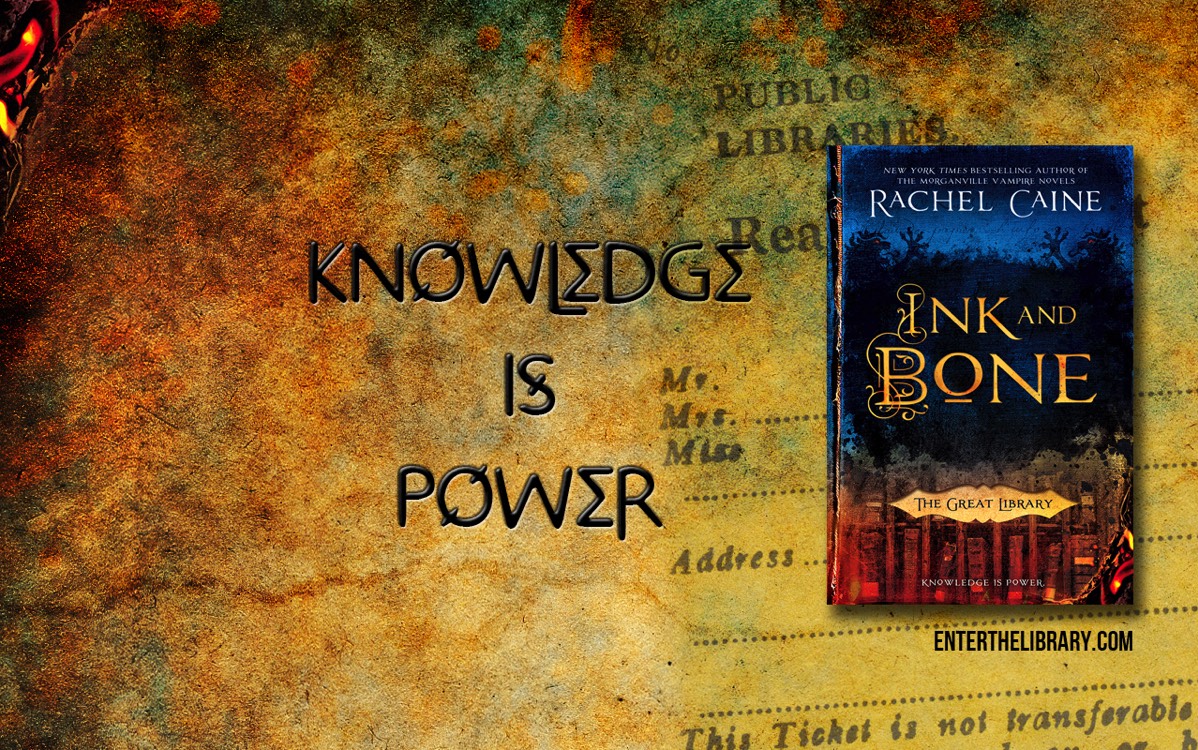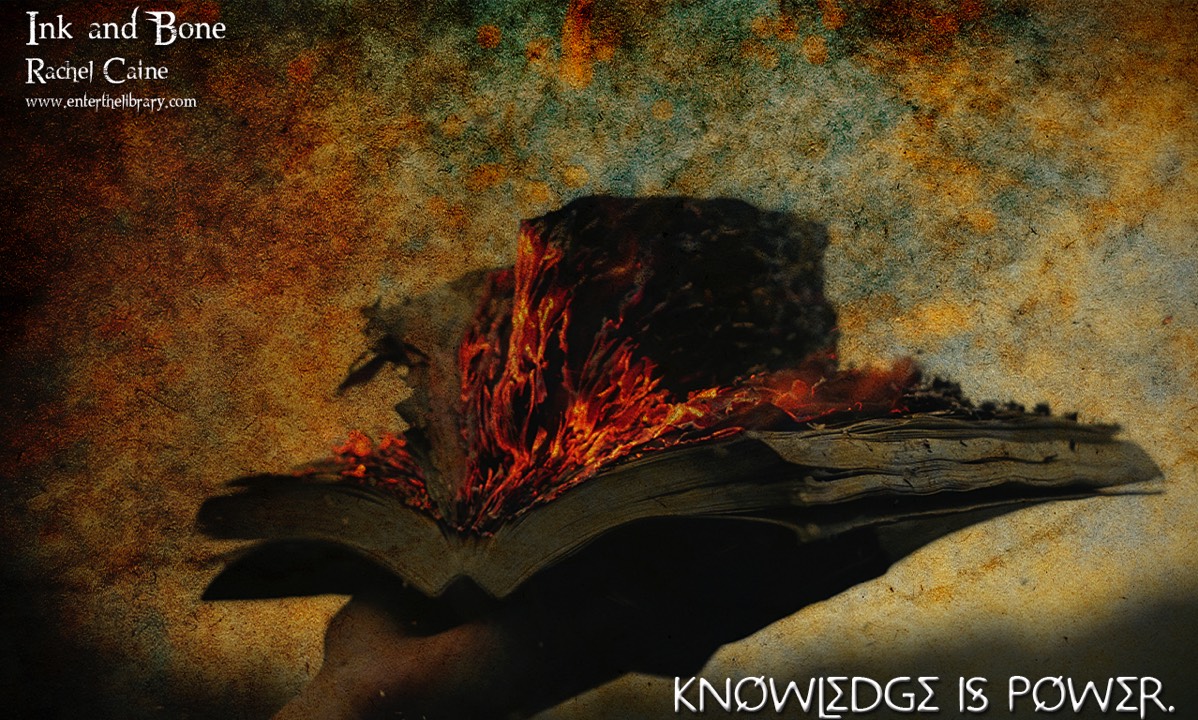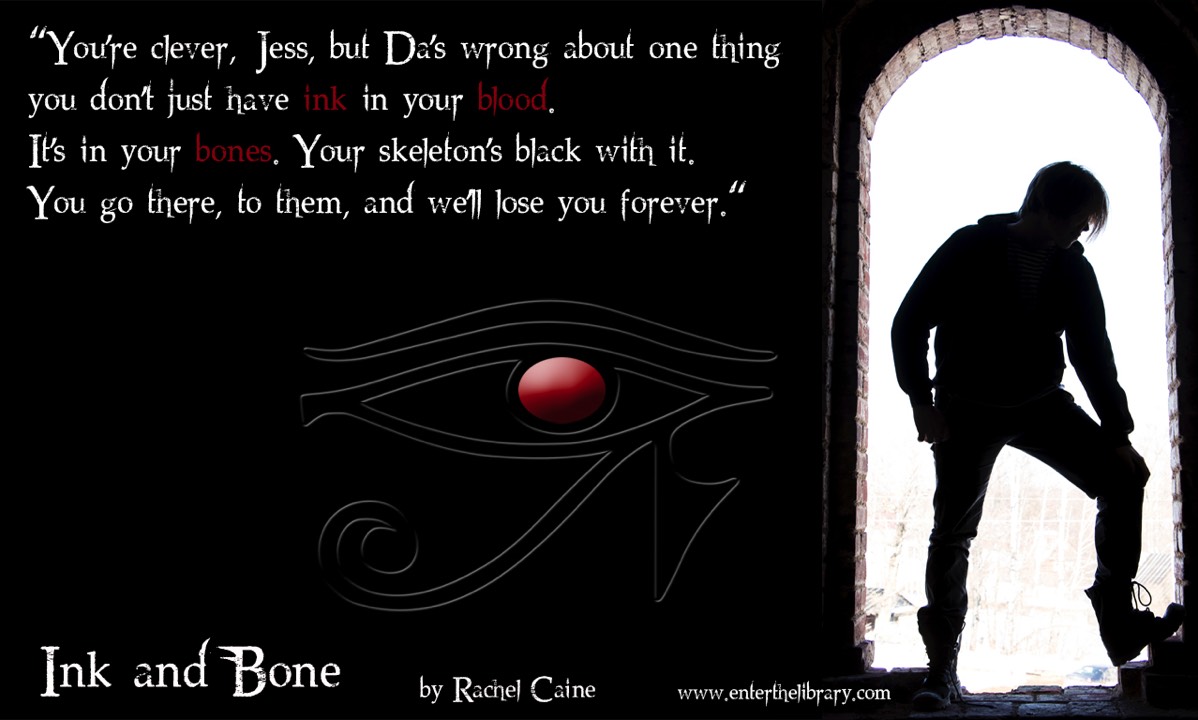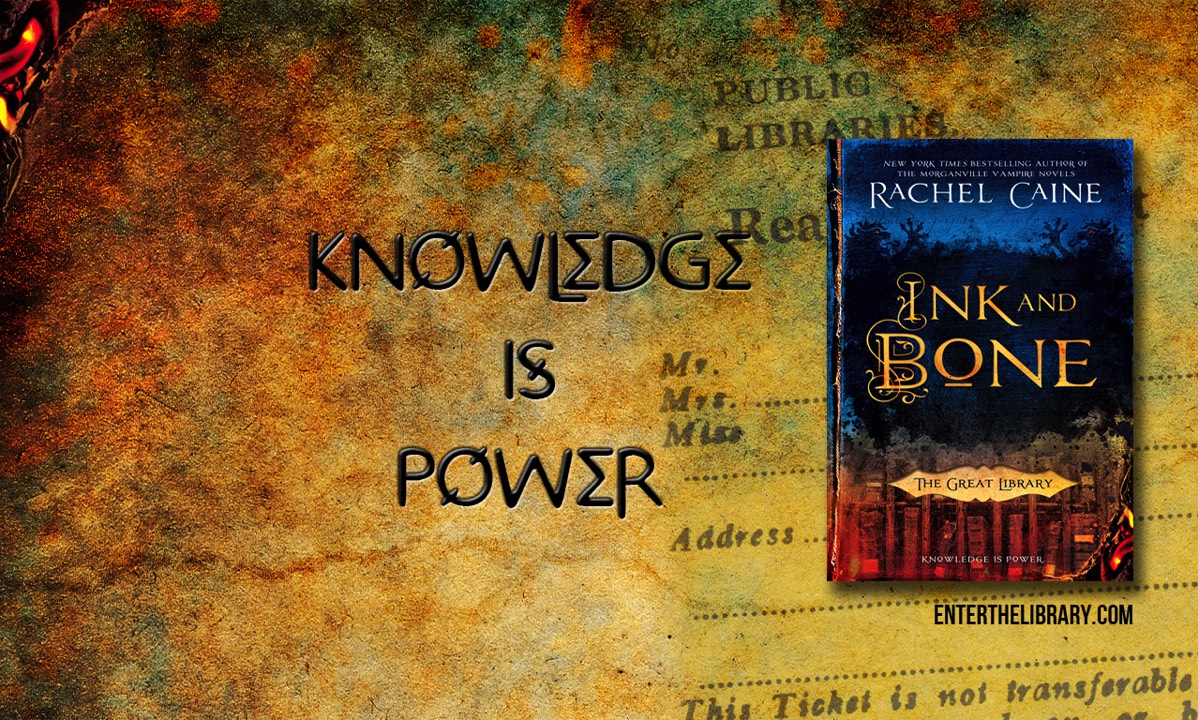
CLASSROOM VISITS
Rachel is available for talks, appearances, and Skype visits for schools and libraries around the US. Use the Contact form for requests.
CLASSROOM RESOURCES
Penguin Random House and Rachel Caine presents teacher and librarian resources for classes that wish to read and discuss the Great Library series, and the historical references included. Please use the Contact page form for requests for visits, donations, and more.
TEACHER GUIDES
POSTERS
DESKTOP WALLPAPERS
RESEARCH INFORMATION
The Great Library of Alexandria
The most fascinating thing about the Great Library is that it was only a small part of one of the most forward-thinking institutions in the ancient world ... one that not only gathered and archived knowledge in the Library, but also housed one of the most remarkable universities, a vast zoo, and much more. The Alexandria Serapeum was the first of its' kind ... a "branch library" in which specific scrolls were made available for the general public to read. It was even more progressive in that it specifically allowed women to study as well.
Alexandria was the pre-eminent center of learning for hundreds of years, until social and religious changes marked the gradual, tragic end of an ancient golden age. It was in some ways a very modern city ... constructed new by Alexander the Great's personal architect Dinocrates, and a completely planned city, built in less than a hundred years into full glory. It had some of the greatest wonders of the time, including the huge Lighthouse of Pharos, the gold (and later, crystal) tomb of Alexander, and of course, the Library complex itself.
One of the most fascinating things about the way that the Library's vast collection was assembled is that it was partly done by force. Ships, traders and visitors were searched, and any scrolls or books that were found were added to the collection (often, without compensation). Many of the treasures stored there were, in fact, looted outright from other civilizations, including that of Egypt itself.
Ultimately, the Library contained half a million works ... and then it all began to go wrong. By 400 A.D. (or, CE, current era), the Great Library and all the collected wisdom it had gathered lay in ruins ... and ashes.
Alexandria was the pre-eminent center of learning for hundreds of years, until social and religious changes marked the gradual, tragic end of an ancient golden age. It was in some ways a very modern city ... constructed new by Alexander the Great's personal architect Dinocrates, and a completely planned city, built in less than a hundred years into full glory. It had some of the greatest wonders of the time, including the huge Lighthouse of Pharos, the gold (and later, crystal) tomb of Alexander, and of course, the Library complex itself.
One of the most fascinating things about the way that the Library's vast collection was assembled is that it was partly done by force. Ships, traders and visitors were searched, and any scrolls or books that were found were added to the collection (often, without compensation). Many of the treasures stored there were, in fact, looted outright from other civilizations, including that of Egypt itself.
Ultimately, the Library contained half a million works ... and then it all began to go wrong. By 400 A.D. (or, CE, current era), the Great Library and all the collected wisdom it had gathered lay in ruins ... and ashes.
Making a New World
Jess's world is a complex place, and in order to create it I drew from many, many sources. From the Great Library of Alexandria, who regularly confiscated original materials, I took the idea that private ownership of books might be made illegal. I also assumed that scientific discoveries made and preserved within the Library hadn't survive in our modern world, due to the constant erosion of knowledge. One branch of that, I decided, would be a blend of science and magic: alchemy. Long abandoned by our time, the Library continues to rely on this rapidly failing technology.
From ancient Greece, I borrowed the concept of the automata, the earliest robots. By most accounts, the ancient Greek scientists created astonishingly advanced machines; it's hard to tell where truth ends and myth begins, but the city of Rhodes was reputed to have moving statues that interacted with passersby. Ancient technology, which we often overlook, was incredibly impressive.
For the anti-Library Burner movement, I wanted to give them a truly deadly advantage ... and found it in Greek Fire, a commonplace weapon whose exact chemical makeup was lost in the early Dark Ages, but is closely related to modern compounds like napalm.
Jess's world is familiar yet alien. In most parts of the world, we revere scholarship and knowledge, but what if that is carried to extremes? What if the Great Library became so powerful, and books so precious, that what was once something to be preserved has become something against which we rebel?
Food for thought. And stories.
From ancient Greece, I borrowed the concept of the automata, the earliest robots. By most accounts, the ancient Greek scientists created astonishingly advanced machines; it's hard to tell where truth ends and myth begins, but the city of Rhodes was reputed to have moving statues that interacted with passersby. Ancient technology, which we often overlook, was incredibly impressive.
For the anti-Library Burner movement, I wanted to give them a truly deadly advantage ... and found it in Greek Fire, a commonplace weapon whose exact chemical makeup was lost in the early Dark Ages, but is closely related to modern compounds like napalm.
Jess's world is familiar yet alien. In most parts of the world, we revere scholarship and knowledge, but what if that is carried to extremes? What if the Great Library became so powerful, and books so precious, that what was once something to be preserved has become something against which we rebel?
Food for thought. And stories.
Other Lost Libraries
The magnificent Epang Palace in ancient China, destroyed in 206 BCE. The Library of Antioch in 364 CE. The Library of Al-Hakam II in 976. Centers of knowledge in Rayy and Ghazna, Nishapur and Nalanda. The Great Library was far from the only loss humanity suffered. The great works of ancient times have been systematically destroyed, many out of religious zeal. You can see it today, in the continuing, heartbreaking destruction of ancient structures by ISIL in the Middle East.
Even the U.S. Library of Congress hasn't been immune ... it was burned by British troops in 1812. Libraries have been damaged or leveled, either as collateral damage or deliberate destruction, in every modern war since. In part, this is deliberate … by erasing the history and culture of a people, the aggressor destroys their link to their past. The enemy can rebuild their history according to their own narrative. History is valuable. It's also treacherous, if written after the fact by the winners.
Here is a partial list of what our collective human history has lost just in the past 50 years:
National Library of Cambodia
Jaffna Public Library in Sri Lanka
Sikh Reference Library in India
Central Library of Bucharest
National and University Library of Bosnia and Herzegovina
Various libraries in Abkhazia
Pol-i-Khomri Public Library in Afghanistan
Virtually every library in Iraq
Egyptian Scientific Institute Library
Ahmed Baba Institute in Bali
Saeh Library in Lebanon
At a conservative estimate, the loss of collected knowledge numbers in the millions of works we can never read, lost forever.
Useful links:
11 Burning Libraries - Strangehistory.net
Wikipedia - List of lost libraries
11 Most Impressive Libraries of the Ancient World
Ancient Archives Lost in Baghdad Blaze
Burning of the Library of Congress
Even the U.S. Library of Congress hasn't been immune ... it was burned by British troops in 1812. Libraries have been damaged or leveled, either as collateral damage or deliberate destruction, in every modern war since. In part, this is deliberate … by erasing the history and culture of a people, the aggressor destroys their link to their past. The enemy can rebuild their history according to their own narrative. History is valuable. It's also treacherous, if written after the fact by the winners.
Here is a partial list of what our collective human history has lost just in the past 50 years:
National Library of Cambodia
Jaffna Public Library in Sri Lanka
Sikh Reference Library in India
Central Library of Bucharest
National and University Library of Bosnia and Herzegovina
Various libraries in Abkhazia
Pol-i-Khomri Public Library in Afghanistan
Virtually every library in Iraq
Egyptian Scientific Institute Library
Ahmed Baba Institute in Bali
Saeh Library in Lebanon
At a conservative estimate, the loss of collected knowledge numbers in the millions of works we can never read, lost forever.
Useful links:
11 Burning Libraries - Strangehistory.net
Wikipedia - List of lost libraries
11 Most Impressive Libraries of the Ancient World
Ancient Archives Lost in Baghdad Blaze
Burning of the Library of Congress
Novels and "The Great Moral Panic"
Today, novels are accepted as one of the most important parts of any library or education ... but was that always the case? There's historical evidence that the ancient Greeks and Egyptians wrote novels, mainly adventure and romance stories, but with the fall of the Dark Ages, there was no time for reading for leisure! It's no accident that Johannes Gutenberg is best known for his printing of the Bible ... his invention was seen as something to enlighten and educate, not entertain.
The modern concept of novels began in the mid-1700s, and almost immediately, concerns arose. It's no accident that it happened around the same time as the re-invention of the Circulating Library, which put those new, exciting works in the hands of ready readers.
Novels were almost immediately seen as dreadful wastes of time, especially for women. Here are a few wonderful quotes from a fantastic paper on the subject written by Ana Vogrinčič Čepič, associate professor, University of Ljubljana:
Women, of every age, of every condition, contract and retain a taste for novels […T]he depravity is universal. My sight is every-where offended by these foolish, yet dangerous, books. I find them on the toilette of fashion, and in the work-bag of the sempstress; in the hands of the lady, who lounges on the sofa, and of the lady, who sits at the counter. From the mistresses of nobles they descend to the mistresses of snuff shops – from the belles who read them in town, to the chits who spell them in the country. I have actually seen mothers, in miserable garrets, crying for the imaginary distress of an heroine, while their children were crying for bread: and the mistress of a family losing hours over a novel in the parlour, while her maids, in emulation of the example, were similarly employed in the kitchen. I have seen a scullion-wench with a dishclout in one hand, and a novel in the other, sobbing o’er the sorrows of Julia, or a Jemima
(Sylph no. 5, October 6, 1796: 36-37)
The most accurate description of this kind of attitude toward novels is a "moral panic," a term coined in the 1970s about drug abuse (i.e., "Reefer Madness") ... and, Prof. Vogrinčič Čepič says, "Moral panic was described as an episode of intensive, exaggerated concern about a particular issue or perceived threat, which – when empirically assessed – turned out not to be especially damaging."
The word "novel" in fact means "new," and this term became popular because it was, in fact, a "new" kind of fiction.
A dangerous kind.
Here are some excerpts from Prof. Vogrinčič Čepič's excellent work, The Novel-Reading Panic in 18th Century in England: An Outline of an Early Moral Media Panic:
[N]ovels – in short – represented fictionalized reality, an image of everyday life of the ordinary people. Instead of traditional epic plots, abstract universality and stylized (either good or bad) characters, they introduced in simple colloquial prose middle and even lower class heroes, placed in contemporary context, thus founding their poetics on credibility and realism in content, yet more in form ...
Written in simple, accessible prose, it was easily understood even to the non-educated, which did not exactly add to its respectability, but rather provoked rebuke. The “unparallel fecundity of authors” (More, 1799) was seen to support the view that: “[e]very love-stricken swain and every melting nymph is qualified to write a love-story which shall pass for a pretty novel; at least with the help of a friend, to spell it and put it together" (The Monthly Review, 1775).
Novels were accused of creating expectations which life could not fulfill, and of wearying the sympathies and producing callousness by constantly exposing the reader to scenes of exciting pathos ... When all the rest failed, laying blame on them for distracting readers from the more useful work, and attributing to them the power of a drug, was always at hand.
The novel did not stand a chance – it was necessarily guilty of something.
And the new circulating libraries? They were seen as purveyors of the drug, and compared to "brothels" and "gin-shops." If you liked novels, you were fanciful, superficial, indolent, hasty, and incapable of serious study. My favorite term she unearthed in her paper is that the library is an "evergreen tree of diabolical knowledge." (The Rivals, 1774)
And how did readers and authors respond? According to Prof. Vogrinčič Čepič, "The way the alleged victims as well as the suspected culprits responded to the situation could also be read as a proof of consensus on the topic, and the similar manner in which authors and readers alike actively shunned the term ‘novel’ itself was no doubt a result of a certain ‘campaign’ against the genre and the stigma that stuck to novel-readers. The same strategies the latter used in disguising their reading habits – hiding the novels away, reading them under false covers or explicitly denying the act at all – all this is a sign of consent, of the recognition of the anxiety, too."
Here's a representative sample of the outrage:
Novels have been long and frequently regarded not as being merely useless to society, but even as pernicious, from the very indifferent morality, and ridiculous way of thinking, which they almost generally inculcate. Why then, in the name of the common sense, should such an useless and pernicious commodity, with which we are over-run, go duty-free, wile the really useful necessary of life is taxed to the utmost extent? A tax on books of this description only (for books of real utility should ever be circulated free as air) would bring in a very considerable sum for the service of Government, without being levied on the poor or the industrious.
(The Gentleman's Magazine, December 1789)
As a modern-day example of how this continues to be an issue, we're not far from the days when romance conventions used to do a brisk trade in fabric book covers to conceal the titles and illustrations from prying eyes.
The continuing echo of "moral panic" can be clearly seen in lectures on the evils of television (it rots your brain!) and video games (corrupting youth!). You'll find multitudes of lectures on that subject everywhere you turn, and it's the same arguments made against those first, moral-eroding novels pushed on us (particularly women) by those "evergreen trees of diabolical knowledge."
That's not to say the moral panic has moved on from novels to new targets. Here are a few examples of articles that continue that not-so-honored tradition ... and note that the articles target exactly the same content, in the same way, that the 18th century moralists did. Notice who the articles really target ... and why. Doesn't it sound familiar now?
"Reading Upward" - The New York Review of Books
"Romance Novels Bad for Women's Health and Psyche" - Livescience.com
"Against YA" - Slate
"Darkness Too Visible" - The Wall Street Journal
"Are Romantic Movies Bad For You?" - TIME Magazine
MANY THANKS to Prof. Vogrinčič Čepič for graciously allowing me to link to, and quote from, her work. Any conclusions or comparisons I've extrapolated are my own, and are not endorsed by her.
The modern concept of novels began in the mid-1700s, and almost immediately, concerns arose. It's no accident that it happened around the same time as the re-invention of the Circulating Library, which put those new, exciting works in the hands of ready readers.
Novels were almost immediately seen as dreadful wastes of time, especially for women. Here are a few wonderful quotes from a fantastic paper on the subject written by Ana Vogrinčič Čepič, associate professor, University of Ljubljana:
Women, of every age, of every condition, contract and retain a taste for novels […T]he depravity is universal. My sight is every-where offended by these foolish, yet dangerous, books. I find them on the toilette of fashion, and in the work-bag of the sempstress; in the hands of the lady, who lounges on the sofa, and of the lady, who sits at the counter. From the mistresses of nobles they descend to the mistresses of snuff shops – from the belles who read them in town, to the chits who spell them in the country. I have actually seen mothers, in miserable garrets, crying for the imaginary distress of an heroine, while their children were crying for bread: and the mistress of a family losing hours over a novel in the parlour, while her maids, in emulation of the example, were similarly employed in the kitchen. I have seen a scullion-wench with a dishclout in one hand, and a novel in the other, sobbing o’er the sorrows of Julia, or a Jemima
(Sylph no. 5, October 6, 1796: 36-37)
The most accurate description of this kind of attitude toward novels is a "moral panic," a term coined in the 1970s about drug abuse (i.e., "Reefer Madness") ... and, Prof. Vogrinčič Čepič says, "Moral panic was described as an episode of intensive, exaggerated concern about a particular issue or perceived threat, which – when empirically assessed – turned out not to be especially damaging."
The word "novel" in fact means "new," and this term became popular because it was, in fact, a "new" kind of fiction.
A dangerous kind.
Here are some excerpts from Prof. Vogrinčič Čepič's excellent work, The Novel-Reading Panic in 18th Century in England: An Outline of an Early Moral Media Panic:
[N]ovels – in short – represented fictionalized reality, an image of everyday life of the ordinary people. Instead of traditional epic plots, abstract universality and stylized (either good or bad) characters, they introduced in simple colloquial prose middle and even lower class heroes, placed in contemporary context, thus founding their poetics on credibility and realism in content, yet more in form ...
Written in simple, accessible prose, it was easily understood even to the non-educated, which did not exactly add to its respectability, but rather provoked rebuke. The “unparallel fecundity of authors” (More, 1799) was seen to support the view that: “[e]very love-stricken swain and every melting nymph is qualified to write a love-story which shall pass for a pretty novel; at least with the help of a friend, to spell it and put it together" (The Monthly Review, 1775).
Novels were accused of creating expectations which life could not fulfill, and of wearying the sympathies and producing callousness by constantly exposing the reader to scenes of exciting pathos ... When all the rest failed, laying blame on them for distracting readers from the more useful work, and attributing to them the power of a drug, was always at hand.
The novel did not stand a chance – it was necessarily guilty of something.
And the new circulating libraries? They were seen as purveyors of the drug, and compared to "brothels" and "gin-shops." If you liked novels, you were fanciful, superficial, indolent, hasty, and incapable of serious study. My favorite term she unearthed in her paper is that the library is an "evergreen tree of diabolical knowledge." (The Rivals, 1774)
And how did readers and authors respond? According to Prof. Vogrinčič Čepič, "The way the alleged victims as well as the suspected culprits responded to the situation could also be read as a proof of consensus on the topic, and the similar manner in which authors and readers alike actively shunned the term ‘novel’ itself was no doubt a result of a certain ‘campaign’ against the genre and the stigma that stuck to novel-readers. The same strategies the latter used in disguising their reading habits – hiding the novels away, reading them under false covers or explicitly denying the act at all – all this is a sign of consent, of the recognition of the anxiety, too."
Here's a representative sample of the outrage:
Novels have been long and frequently regarded not as being merely useless to society, but even as pernicious, from the very indifferent morality, and ridiculous way of thinking, which they almost generally inculcate. Why then, in the name of the common sense, should such an useless and pernicious commodity, with which we are over-run, go duty-free, wile the really useful necessary of life is taxed to the utmost extent? A tax on books of this description only (for books of real utility should ever be circulated free as air) would bring in a very considerable sum for the service of Government, without being levied on the poor or the industrious.
(The Gentleman's Magazine, December 1789)
As a modern-day example of how this continues to be an issue, we're not far from the days when romance conventions used to do a brisk trade in fabric book covers to conceal the titles and illustrations from prying eyes.
The continuing echo of "moral panic" can be clearly seen in lectures on the evils of television (it rots your brain!) and video games (corrupting youth!). You'll find multitudes of lectures on that subject everywhere you turn, and it's the same arguments made against those first, moral-eroding novels pushed on us (particularly women) by those "evergreen trees of diabolical knowledge."
That's not to say the moral panic has moved on from novels to new targets. Here are a few examples of articles that continue that not-so-honored tradition ... and note that the articles target exactly the same content, in the same way, that the 18th century moralists did. Notice who the articles really target ... and why. Doesn't it sound familiar now?
"Reading Upward" - The New York Review of Books
"Romance Novels Bad for Women's Health and Psyche" - Livescience.com
"Against YA" - Slate
"Darkness Too Visible" - The Wall Street Journal
"Are Romantic Movies Bad For You?" - TIME Magazine
MANY THANKS to Prof. Vogrinčič Čepič for graciously allowing me to link to, and quote from, her work. Any conclusions or comparisons I've extrapolated are my own, and are not endorsed by her.
